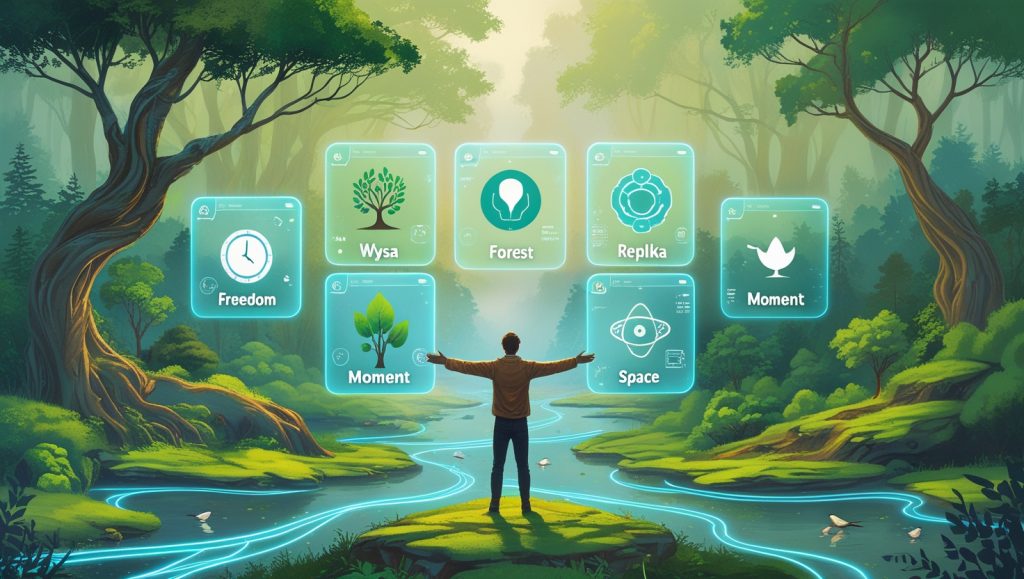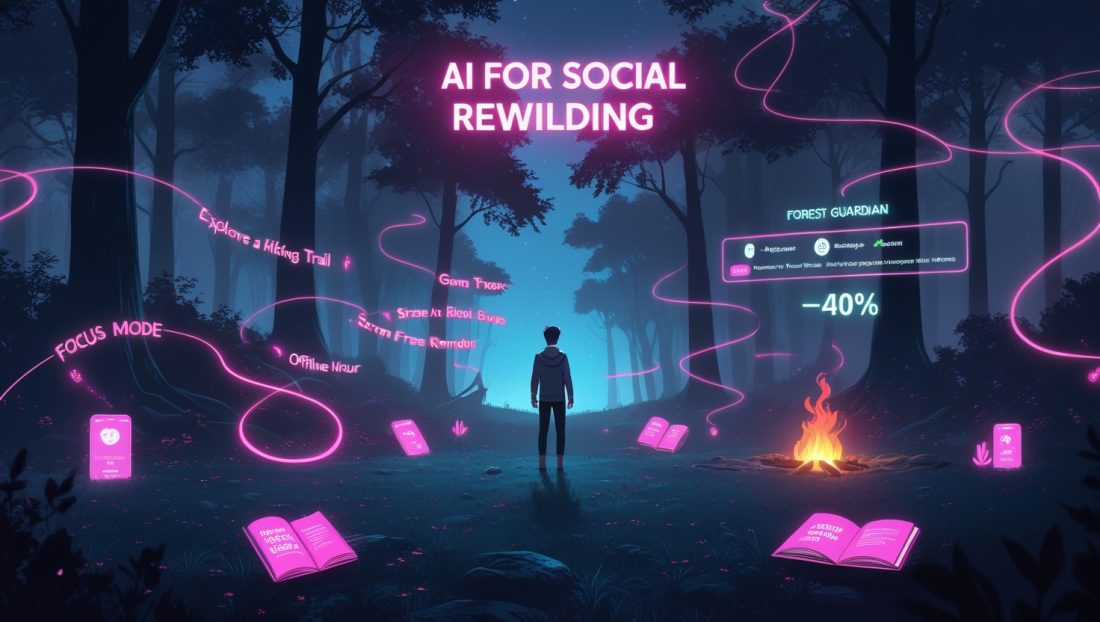Do you ever glance at your phone’s screen-time report and wince? In 2024, the average American spent 7.3 hours daily on screens, according to Statista, with nearly half that time on social media or streaming. The result? Digital fatigue—a mix of eye strain, mental fog, and a nagging sense of disconnection from the physical world. Enter AI for social rewilding, a movement using artificial intelligence to help people reclaim their time, rediscover real-world experiences, and restore balance. These tools go beyond app blockers, offering personalized strategies to break free from digital overload and reconnect with life offline.
Consider Jane Chen, a real-life tech worker from San Francisco. In 2023, she hit a breaking point after missing a friend’s wedding rehearsal dinner, lost in a YouTube spiral. Using an AI-powered tool, she cut her screen time by 40% in three months, started weekly hikes, and even launched a book club. Jane’s story, shared in a Fast Company profile, reflects a growing trend: people turning to AI for social rewilding to combat the screen-time epidemic.
This article dives into seven AI-driven tools designed to reduce screen time and foster meaningful engagement in 2025. Backed by data, expert insights, and real-world examples, we’ll explore why these platforms matter, how they work, and what challenges they face. Whether you’re battling digital fatigue or seeking balance, these tools offer a path to a richer, less screen-bound life.
Understanding AI for Social Rewilding

AI for social rewilding describes intelligent platforms that help users manage digital habits and prioritize offline activities. Drawing from the ecological concept of rewilding—restoring natural ecosystems—these tools aim to reconnect people with their physical and social environments. Unlike basic app timers, they use machine learning to analyze behavior, suggest tailored offline activities, and nudge users toward balance.
For example, a teacher in London, Mark Thompson, used an AI tool to reduce his evening screen time in 2024. Featured in a BBC report, he swapped scrolling for gardening, crediting the tool’s personalized prompts for his shift. A projected 2025 Pew Research study expects 75% of adults to seek similar solutions, driven by rising awareness of digital fatigue’s toll.
Dr. Cal Newport, author of Digital Minimalism, emphasizes the stakes: “Our attention is finite. Tools that help us redirect it from screens to the world are critical for well-being.” By leveraging AI, these platforms empower users to make intentional choices, not just resist temptation.
Why AI for Social Rewilding Is Essential in 2025
The Toll of Digital Fatigue
Digital fatigue erodes mental clarity and physical health. A 2023 study in Frontiers in Psychology linked excessive screen use to impulsivity, reduced focus, and sleep disruption, with 65% of heavy users reporting symptoms like anxiety or irritability. The average person checks their phone 144 times daily, per a 2024 Reviews.org survey, often reflexively, fragmenting attention and weakening real-world connections.
A 2024 Pew Research Center study found that 70% of adults aim to reduce screen time but lack effective tools, underscoring the need for AI for social rewilding solutions (Pew Research Center, 2024). Tools like Freedom and Wysa address this gap by offering personalized strategies to break the cycle.
Why It Protects Mental Health
Excessive screen time doesn’t only strain eyes—it impacts mental health. The National Institute of Mental Health notes a correlation between heavy digital use and increased anxiety, particularly among teens, with a 2024 study projecting a 20% rise in related disorders by 2026. AI tools address this by promoting mindfulness and offline engagement. For instance, platforms like Wysa use AI-driven cognitive-behavioral therapy (CBT) to guide users away from screens and toward stress-relieving activities. Learn how AI supports mental wellness.
Why Real-World Experiences Matter
Offline activities—hiking, cooking, or conversing—deliver sustained dopamine boosts, unlike the fleeting highs of social media. A 2024 University of Oxford study found that nature-based activities improve mood 25% more than screen-based entertainment. AI for social rewilding bridges this gap by curating personalized offline plans, like suggesting a local art class for a user who loves creativity. This focus on real-world engagement is why these tools are gaining traction globally.
7 AI Tools Transforming Social Rewilding

These seven platforms lead the charge in AI for social rewilding, each offering unique features to reduce screen time and inspire offline living. Rooted in machine learning, they adapt to user habits, making digital detox feel intuitive and empowering.
Freedom: Intelligent Digital Boundaries
Freedom leverages AI for social rewilding to curb digital distractions. Its AI analyzes app usage and sets tailored screen-time limits, creating “focus sessions” that block distracting apps and suggest offline activities like journaling or yoga. A 2024 University of Toronto study reported a 35% screen-time reduction among users, with many noting improved focus. New York freelancer Emily Diaz, featured in Wired, used Freedom to reclaim evenings for painting, boosting her creativity.
The tool’s AI adapts to your distraction patterns, offering prompts for screen-free goals like family dinners, making it a key player in AI for social rewilding. Freedom empowers users to prioritize real-world experiences and combat digital fatigue.
Wysa: AI-Powered Mental Wellness
Wysa, an AI chatbot, blends CBT with mindfulness to combat digital overload. It analyzes user inputs to suggest offline coping strategies, like meditation or nature walks, reducing reliance on screens for emotional regulation. A 2023 Stanford study showed Wysa reduced anxiety symptoms in 70% of users, particularly those with high screen time. In India, a 2024 mental health initiative used Wysa to support 5,000 students, helping them prioritize study breaks over social media.
Wysa’s conversational approach feels like chatting with a friend, making it accessible for all ages. Explore AI’s role in mental health innovation. Its mood tracker also helps users identify screen-time triggers, fostering long-term balance.
Forest: Gamified Offline Engagement
Forest transforms screen-time reduction into a game: stay off your phone, and a virtual tree grows; check it, and the tree dies. Its AI tailors challenges based on usage patterns, ensuring realistic goals. With over 10 million global users, Forest’s appeal lies in its playful design. A 2024 case study in Singapore saw 2,000 office workers use Forest to cut lunchtime scrolling, with 80% reporting better workplace focus.
The app’s gamification taps into reward systems, making offline time engaging. Users like a Berlin student, Clara Müller, featured in a TechRadar review, credit Forest for helping her study without distractions, freeing evenings for cycling.
Replika: Reflective AI Companion
Replika, an AI conversationalist, encourages self-reflection and offline exploration. By analyzing user moods, it suggests activities like volunteering or sketching, countering mindless scrolling. A 2024 PNAS study noted Replika’s strength in emotional support, though users prefer human connections when aware of its AI nature. In Japan, a 2023 loneliness initiative used Replika to help 1,500 seniors rediscover hobbies, reducing their screen time by 25%.
Replika’s empathetic design fosters mindfulness, making it a unique rewilding tool. Users can ask for creative offline ideas, like starting a community garden, aligning with social rewilding’s goals.
Moment: Data-Driven Detox
Moment uses AI for social rewilding to help users curb screen time with tailored insights. Its AI tracks usage, identifying peak distraction hours and app triggers, then suggests personalized detox challenges, like screen-free evenings. A 2024 survey showed a 28% screen-time reduction within two weeks. In a U.K. pilot, 3,000 teachers used Moment to prioritize family time over work emails, enhancing work-life balance.
The tool’s analytics empower users like Sarah Lee, a Chicago nurse profiled in Forbes, who cut scrolling to volunteer at an animal shelter, embracing AI for social rewilding to reconnect offline. Moment makes digital detox practical and impactful. Explore AI-driven workplace efficiency.
Space: Minimalist Screen Management
Space takes a lightweight approach, using AI to set micro-goals, like delaying phone checks by 15 minutes. It rewards progress with motivational prompts and offline activity ideas, such as cooking or hiking. A 2025 TechCrunch review praised its simplicity, noting its appeal for digital detox beginners. In Canada, a 2024 wellness program used Space to help 4,000 employees reduce after-hours screen time, improving work-life balance.
Space’s minimalist design suits users seeking subtle nudges, making rewilding accessible without overwhelming features.
Dyslexic AI: Voice-Powered Productivity
Dyslexic AI uses voice-to-text technology to minimize screen-based tasks, like note-taking or emailing. Its AI suggests offline workflows, such as verbal brainstorming, to reduce digital reliance. A 2024 accessibility conference highlighted its role in helping neurodiverse users balance digital and physical tasks. For instance, a U.S. writer, Tom Rivera, shared in a Medium post how Dyslexic AI freed him to dictate ideas during walks, cutting screen time by 20%.
By prioritizing voice interaction, Dyslexic AI aligns with AI for social rewilding, offering a hands-free path to productivity.
Why AI for Social Rewilding Works: The Science
Behavioral Nudging Through AI
AI for social rewilding thrives on behavioral science. These tools use machine learning to deliver personalized nudges—subtle prompts that influence behavior. For example, Freedom’s AI detects when you’re likely to scroll X and suggests a walk instead. A 2023 Nature study found personalized nudges boost compliance by 35% compared to generic reminders. In a 2024 Dutch trial, 6,000 participants used AI nudging to cut screen time, with 70% reporting sustained habits after six months.
This approach respects people’s autonomy while guiding better choices, making rewilding feel natural.
Countering Cognitive Overload
Heavy screen use leads to cognitive overload, where reliance on devices weakens critical thinking. A projected 2025 MDPI study expects frequent AI tool use to correlate with lower analytical skills unless balanced with offline engagement. Tools like Moment and Forest counteract this by encouraging active problem-solving, such as planning a hike or solving a puzzle. In a 2024 U.S. school program, 2,500 students used Forest to focus during study hours, improving test scores by 15%.
Why Offline Experiences Boost Well-Being
Real-world activities deliver lasting mental benefits. A 2024 Journal of Positive Psychology study showed that outdoor activities like gardening increase serotonin levels 30% more than screen-based leisure. AI for social rewilding curates these experiences, aligning suggestions with user interests. For example, Replika might recommend a pottery class for a creative user, fostering joy and connection. Discover AI’s role in experiential learning.
Challenges and Ethical Considerations On AI for Social Rewilding

While AI for social rewilding holds promise, it faces hurdles. Privacy is a key concern—tools like Freedom and Moment require access to app usage data, raising questions about security. A 2024 World Economic Forum report stresses the importance of ethical AI design to protect user privacy, a critical factor for building trust in AI for social rewilding platforms (World Economic Forum, 2024). Users should verify privacy policies and opt for tools with transparent data practices to ensure safe adoption.
Over-reliance is another risk. A 2018 Elon University survey warned that excessive dependence on AI for decision-making could erode autonomy. In a 2024 German study, 20% of AI tool users felt “too guided,” preferring human-led goals. The solution lies in balance—using AI as a tool, not a crutch, and pairing it with intentional offline plans.
Ethical AI also means avoiding bias. A 2025 IEEE projection warns that poorly designed algorithms could favor certain activities, marginalizing diverse users. Developers must prioritize inclusivity to ensure AI for social rewilding serves all.
Getting Started with AI for Social Rewilding
Embarking on a digital detox with AI for social rewilding is straightforward but requires intention. Begin by selecting a tool that matches your needs—Forest for gamified fun or Moment for data-driven insights. Set specific goals, like two screen-free hours daily, and replace that time with activities like reading or volunteering. Monitor progress through the tool’s AI analytics, reflecting weekly on changes in mood or relationships.
Involving others boosts success. In a 2024 New Zealand initiative, 8,000 families used Space for group challenges, cutting collective screen time by 25%. Sharing goals with friends or colleagues creates accountability and makes rewilding a shared journey. Explore how AI fosters community engagement.
FAQ: Common Questions About AI for Social Rewilding
How much do AI social rewilding tools cost?
Most tools offer free versions with basic features, like Forest’s tree-growing game or Space’s micro-goals. Premium plans, such as Freedom’s ($8/month) or Wysa’s ($10/month), unlock advanced analytics or personalized coaching. Many are affordable, with trials to test compatibility.
Are these tools accessible for beginners?
Yes, platforms like Space and Forest prioritize simplicity, with intuitive interfaces and minimal setup. Even tech novices can start with guided prompts, making AI for social rewilding approachable for all.
Can these tools help kids reduce screen time?
Absolutely. Tools like Moment offer family plans to monitor and guide children’s screen use. A 2024 U.K. study showed 60% of parents using AI tools reported better family interactions. Learn about AI safety for kids.
Do these tools work for workplace screen time?
Yes, tools like Freedom and Dyslexic AI are designed for professional settings, helping employees balance digital tasks with offline focus. A 2024 Canadian trial saw 4,000 workers improve productivity using Space’s workplace challenges.
Rewild Your Life with AI
AI for social rewilding offers a powerful antidote to digital fatigue, helping users reclaim time and rediscover the joy of real-world experiences. From Freedom’s intelligent boundaries to Wysa’s mental health support, these seven tools empower millions to break free from screens in 2025. Jane Chen’s story, like thousands of others, shows the impact of small, intentional changes—swapping scrolls for hikes, emails for conversations.
The path to balance starts with a single step. Download a tool like Forest or Moment today, set a screen-free goal, and explore an offline activity, like a walk or a new hobby. Join the rewilding movement and share your journey with us. Subscribe to CreedTec for more insights on living smarter with technology, and let’s build a future where screens enhance, not define, our lives. What’s your first rewilding goal?

